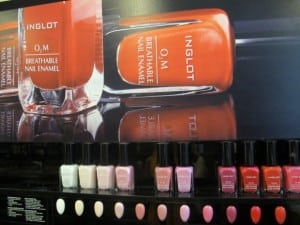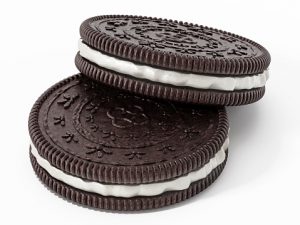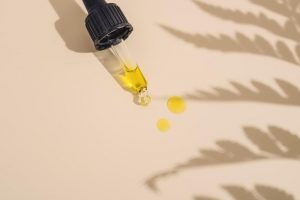Written by : Hannah Lucinda Smith
Is there really such a thing as halal nail polish?

Hamra was thronging with early drinkers and late-night shoppers on a humid evening in June. Beirut’s quirkiest district, beloved of the city’s university students and fashion crowd, is jammed with shops, restaurants and bars, and locals and tourists alike flock to them no matter the weather or political situation. Along Ras Beirut, the area’s main street, the countless fashion and make-up stores jostle so vigorously for attention that it takes something special to make a shopfront stand out.
But as I walked along Ras Beirut, a plain white notice on the glass door of the Inglot nail polish store made me stop and look inside to find out more. “Halal Certified!” it exclaimed. I had never thought that nail polish was not halal in the first place, and wondered what made this one so different.
Inside, the store manager, Maha, carefully explained the concept. What makes this nail polish halal is not its ingredients, as I had assumed when I read the sign. The problem with conventional nail polish is that water cannot permeate it, which means that Muslim women must remove it before performing wudhu, the ritual washing before prayers. “If water doesn’t get to the nails then the washing hasn’t been done properly,” she explained.
Polish cosmetics brand Inglot developed its breathable nail polish three years ago, but not with the Muslim market in mind. “It’s a health thing,” said Maha. “If you wear nail polish all the time then air can’t get to your nails, and it’s not good for them.” The polish, made from the same breathable polymer as contact lenses, quickly gained a reputation for being long lasting and chip resistant when it hit the market. “I’m not a practicing Muslim, but I wear it,” said Maha, holding up her hands to show me her impeccable bright red talons.
Late last year, Sheikh Mustafa Umar, a director at the Islamic Institute of Orange County, declared the product to be halal due to the fact that water vapor can reach the nail through the polish. On his website, he details an experiment that one of his female students conducted: she painted standard nail polish on a coffee filter next to Inglot’s breathable polish, placed another filter underneath it, and dropped water onto both. The filter underneath the standard polish was dry when they checked it—but the one under the Inglot polish was damp, thus proving that it is permeable and therefore suitable for wudhu.
Knowingly or not, the sheikh started a fashion sensation: all over the Muslim world, women reveled in their new freedom to paint their nails whenever they liked. “Before they could only do it when they had their period and couldn’t pray anyway,” Maha said. “Now they can wear it all the time.”
It is strange that it has taken this long. Arab women are incredibly fashion conscious—the rows of designer shops that cartwheel out from Nejmeh Square in the heart of downtown Beirut are clear evidence of this. At any time of day, the women of the city—whether their heads are covered or not—are pristinely made up. By lucky coincidence, Inglot has scored a marketing coup: Maha says that women from Egypt, Libya and Jordan—countries where the brand is not yet available—come to the Beirut store and buy up bottles in bulk. “I’ve had women buy three hundred bottles at a time,” she said. She told me that they have just had a new delivery, but two days ago the stocks were almost finished. “There are sixty-nine colors, but we only had two left.”
On the Internet, however, a debate is raging about whether the nail polish can be considered truly halal. Malaysian Muslim fashion blogger Shea of My Amethyst thinks not—she argues that for wudhu to be performed properly actual water, and not just water vapor, has to reach the nail. Mufti Suhail Tarmahomed, a South African cleric, makes the same point. And to confuse the argument further, back in 2009 the Shi’ite cleric Ayatollah Mohammad Fadlallah issued a fatwa stating that even standard nail polish can be considered halal, as it forms only a thin barrier and sits tight against the body. So could Inglot’s popularity with Muslim women be short lived?
For now, it seems not: Maha told me that in the Gulf states Inglot is selling a million bottles every couple of days. At USD 15 to 20 a bottle, the brand is pulling in huge profits from the Muslim market. And other brands are realizing the selling potential of halal nail polish and are developing their own breathable brands. So while opinion is split on the science and religion scene, the trend that Inglot started does not seem to be in danger of disappearing any time soon.



